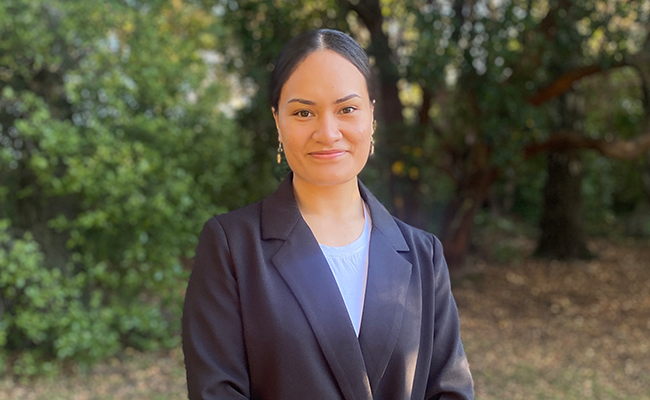Friday 19 May 2023 1:31pm

Saane Fakapulia has been awarded the 2022 Richard Kammann Well-Being Prize.
Saane Fakapulia, a Master of Science (Anatomy), student has been awarded the 2022 Richard Kammann Well-Being Prize for her PGDipSci thesis, ‘An in-depth look into the education experiences of Pasifika Anatomy Students’.
“Saane’s thesis was a thought provoking and impressive piece of work about the cultural barriers to Pasifika students”, says Professor Tamlin Conner Chair of the Prize selection committee and Professor of Psychology at Otago.
Fakapulia, whose family is originally from Tonga, grew up in South Auckland. She developed a passion for biology at school, and says she was particularly inspired by her biology teacher and being a part of her school’s Health Science Academy Programme. A scholarship to attend a foundational year in 2017 at Otago followed, which paved the way for a smoother transition to university study.
“Moving away for university is a big step but scholarships are huge in Pasifika families, and my parents were very happy for me to come down to Dunedin, and I now flat with my younger sister, who’s also a student here,” she says.
Fakapulia found many Pasifika students in Te Tari Kikokiko at Te Whare Wānanga o Ōtākou face challenges.
“We conducted online talanoa with 24 Pasifika undergraduate students to gain feedback about their experiences. The students reported having challenges in living independently, culture shock, and academic struggles while living in Ōtepoti.”
“They reported a range of personal and institutional barriers that included adapting to learning styles for anatomy, workload content, and the need for more culturally competent support. Approaching lecturers can be very hard for Pasifika students, and the study of anatomy deals with a lot of subject matter that may be considered tapu for them.”
The students in the talanoa recommended extracurricular support (for example, writing workshops), improving staff-student communication (more information on scholarship and research), and increasing Pasifika presence, through employing more Pasifika staff, and the use of visuals (such as art and signs).
Fakapulia says that Aotearoa’s universities can and should explore strategic ways to improve academic outcomes of Pasifika students.
Professor Tamlin went on to say that the selection committee was impressed with the insights generated from Fakapulia’s work, and that the project had translational potential for improving the well-being of Pasifika students, not just in the Anatomy Department, but across the University.
“It was clear to the committee that she engaged deeply with this project, revealing outstanding insights into an important applied topic. We hope this prize encourages her to continue her scholarly endeavours and leadership in this area”, Professor Tamlin says.
Fakapulia is continuing her research into the experiences of Pasifika Anatomy students through her Master’s thesis which will investigate how the students view anatomical images by using special headsets to measure how long they gaze at the images.
“I want to give special thanks to my PGDipSci supervisors, Dr Erik Wibowo and Latika Samalia, both of the Anatomy Department, for taking a chance on me and for their constant support and constructive feedback throughout my research project,” Fakapulia says.
The Richard Kammann Wellbeing Prize was founded in 1986 in memory of Associate Professor Richard Kammann who taught in the Department of Psychology at the University of Otago and whose research interests included the application of psychology to human happiness, well-being, and real-world behaviour.
- Kōrero by the School of Biomedical Sciences Communications Adviser, Sally Knox.
